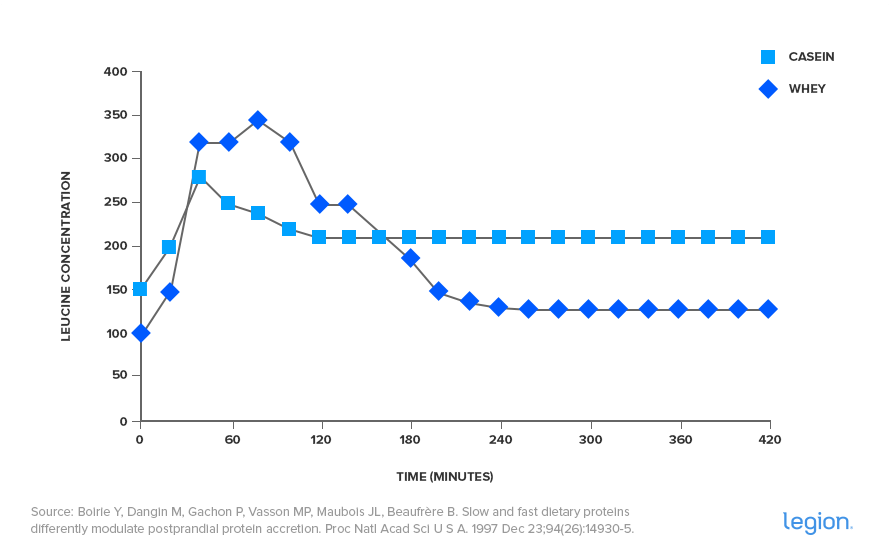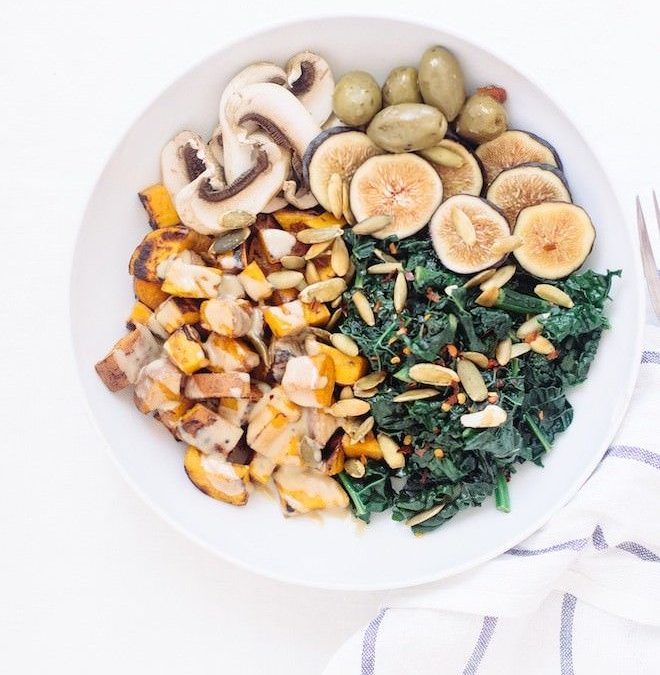The Complete Guide to Casein Protein Powder
Casein protein powder is a high-protein bodybuilding supplement derived from cow’s milk.
Although casein protein powder isn’t as ubiquitous or popular as whey protein powder, there are many casein protein powder benefits that make it a worthwhile choice for anyone looking to build muscle, lose fat, and get strong.
That said, picking the best casein protein powder can be disconcerting. Some claim to be the best for building muscle, others claim to be the best absorbed, and still others claim to be the best for recovery.
In this article, you’ll learn what really makes the best casein protein powder (hint—it has little to do with any of the things just mentioned), as well as answers to common questions about casein protein such as . . .
- What is casein protein powder?
- What are the benefits of casein protein powder?
- What are side effects associated with using casein?
- What’s the best casein protein powder you can buy?
- And more!
What Is Casein Protein Powder?
Casein is the main type of protein found in cow’s milk.
Casein protein powder is the dried and powdered form of casein that’s often used as a bodybuilding supplement. It’s made by removing the whey from milk to create casein isolate, which is then spray-dried to create casein protein powder (basically the same process that’s used to create instant coffee).
Casein is popular among bodybuilders because it . . .
- Is a complete protein source, meaning it contains all the essential amino acids your body must get from food.
- Is rich in leucine, which plays a vital role in initiating muscle protein synthesis (which helps you get more jacked over time)
- Digests slowly, which results in a steadier release of amino acids into the blood and helps keep you full for longer.
The best kind of casein protein powder you can get is known as micellar casein.
Micellar casein is produced in a way that preserves the small bundles of protein (micelles) that are responsible for its slow-digesting properties.
The downside of this process is that it’s more expensive than the alternatives. Cheaper kinds of casein protein powder are created by separating the casein from the whey using chemicals that also destroy the micelles. These types of casein protein powders are referred to as caseinates, and you’ll usually see them listed on ingredient labels as sodium, potassium, magnesium, or calcium caseinate (these chemicals are used to help separate the whey and casein).
Since caseinates don’t contain micelles, they digest much faster than micellar casein (making them more similar to whey).
Another important difference between the two is that micellar casein is more satiating than caseinate, which is generally preferable if you’re “cutting” (eating in a calorie deficit). Additionally, caseinates don’t have the rich, creamy texture that you get with micellar casein.
The Difference Between Whey and Casein Protein Powder
Whey and casein protein powders are more similar than they are different.
For instance, they’re both derived from milk, they’re both high in all nine essential amino acids, and most scientific research shows they’re more or less comparable when it comes to building muscle.
The main difference between these close cousins is digestion speed.
Whey protein powder is rapidly digested, which means it causes a large spike in blood levels of amino acids after you consume it. After this spike, however, blood levels of amino acids fall back to baseline relatively quickly.
In contrast, casein protein powder is digested much slower than whey, which causes blood levels of amino acids to stay elevated for up to six hours. The tradeoff is that casein doesn’t elevate blood levels of amino acids quite as high as whey protein.
Here’s a graph to illustrate this point:

There’s an ongoing debate as to how important this difference in digestion time is for gaining muscle, but here’s what most reputable experts agree on:
- Whey’s rapid digestion and abundance of leucine makes it a great choice for postworkout nutrition.
- Casein may or may not be as good for postworkout nutrition as whey.
- Casein is just as good as whey for general supplementation needs (it works equally well for reaching your daily protein target).
- You may be able to speed up muscle recovery by having 30-to-40 grams of a slow-burning protein like casein (or low-fat cottage cheese or Greek or Icelandic yogurt) before bed.
- Casein may be slightly better for cutting due to its appetite-suppressant and anti-catabolic effects (more on this in a moment).
The bottom line is that you shouldn’t tie yourself in knots when trying to choose between whey and casein. They both have almost the same impact on your ability to build muscle, and which one you choose should largely come down to personal preference.
In terms of taste and texture, whey tends to have a lighter, more refreshing flavor and mouthfeel, whereas casein tends to be thicker and more creamier (which is why it’s often used in high-protein puddings, pancakes, and other recipes).
Casein Protein Powder Benefits
The main benefits of supplementing with casein protein powder are . . .
- It’s convenient and tasty, which makes it easier to follow a high-protein diet.
- It’s rich in essential amino acids and well digested and absorbed, which makes it ideal for muscle-building purposes.
- It’s digested slowly, providing a steady, gradual release of amino acids into the blood.
Supporting muscle growth isn’t the only way casein helps you improve your body composition, though. Research shows it may also help increase fat loss more than whey protein when combined with a calorie-restricted diet.
In one study conducted by scientists at Brigham and Women’s Hospital, participants were split into one of three groups:
- A supplement-free group that ate in a 20% calorie deficit and lifted weights 4 days per week.
- A casein protein powder group that ate in a 20% calorie deficit, lifted weights 4 days per week, and took a casein protein powder supplement.
- A whey protein powder group that ate in a 20% calorie deficit, lifted weights 4 days per week, and took a whey protein powder supplement.
After 12 weeks, the groups that supplemented with casein or whey gained significantly more muscle than the group who didn’t use a protein supplement.
However, the casein protein powder group also lost significantly more fat (and gained significantly more strength) than both the whey protein powder and supplement-free groups.
Scientists aren’t entirely sure why this occurred. It could have simply been due to random chance or measurement error (which isn’t uncommon in scientific research), or it could also have been due to greater compliance with the diet and training program on the part of the people who consumed casein protein powder.
A third possibility is that since casein protein digests slower and releases amino acids into the blood over a longer period of time than whey protein, it may help reduce food intake and preserve muscle slightly better. Personally, I think the first two options are more likely, and that the differences between whey and casein are too small to matter, but it’s an interesting finding nonetheless.
In addition to supporting muscle growth and fat loss, research also shows that casein may . . .
- Support immune function
- Reduce high blood pressure
- Lower cardiovascular disease risk
- Act as an antioxidant
. . . although there isn’t as much evidence to support these claims (yet).
Casein Protein Powder Side Effects
Eating a high-protein diet and supplementing with protein powders isn’t inherently unhealthy, and normally doesn’t cause any unwanted side effects.
The only people who need to be careful about the amount of protein they eat are those with pre-existing kidney damage or dysfunction.
That said, some people suffer digestive issues (such as bloating or gas) when they get a significant portion of their daily protein intake from protein powders or bars.
The best way to avoid this is to get the majority of your daily protein needs from nutritious foods, and use casein (or other) protein supplements to make up the difference. Specifically, two helpful rules of thumb for avoiding casein protein powder side effects are:
- Don’t get more than 30% of your daily calories from protein powders (casein or otherwise).
- Don’t have more than 40-to-50 grams of protein from powder in one sitting.
What Is the Best Casein Protein Powder?
If you want a clean, 100% natural, delicious micellar casein protein powder that’s naturally sweetened and flavored and contains no artificial dyes or other chemical junk, try Casein+.
Casein+ is made with exceptionally high-quality milk from small, sustainable dairy farms in Ireland that have been certified by Ireland’s Sustainable Dairy Assurance Scheme (SDAS).
This ensures the farmers adhere to best practices in animal welfare, sustainability, product quality, traceability, and soil and grass management, which is why Casein+ is the perfect choice for clean, high-protein, healthy-for-you-and-the-cows protein shakes that are a cut above the rest.
It also means that Casein+ has a stellar amino acid profile, providing you with 13 grams of essential amino acids—including 3 grams of leucine, the amino acid most responsible for stimulating protein synthesis—per serving.
So, if you want a clean, convenient, and delicious source of protein, try Casein+.
FAQ #1: Is organic casein protein powder better than conventional?
Generally speaking, the more time cows spend outside eating grass, and the less they are injected with a genetically modified growth hormone, the more nutritious their milk and beef is.
Therefore, organic casein protein powder is sometimes better than conventional.
The reason I say “sometimes” better is that the term “organic” means different things in different parts of the world. In some cases, cows raised under “organic” conditions may eat very similar diets to cows raised in “conventional” environments, in which case the casein from their milk will have more or less the same health properties.
Thus, instead of specifically looking for organic casein protein powder, it’s better to look for casein protein powder that’s produced by companies that are open about where they source their casein and the farming practices used by their suppliers (like Legion).
This way you can make an informed decision about the quality of the casein you’re purchasing, rather than assuming that the organic label means the product is potent, pure, and ethically sourced (it doesn’t).
FAQ #2: What’s the difference between expensive and cheap casein protein powder?
Unlike top-shelf casein protein powders, like Casein+, cheap casein protein powders often contain nonessential filler ingredients like maltodextrin, which is a cheap carbohydrate used to improve consistency and shelf life and reduce costs, or milk protein concentrate, an inexpensive blend of milk proteins also used to improve the bottom line.
A good way to protect yourself against this as a consumer is to check the ingredient list and look at the amount of protein per scoop relative to the scoop size, because a large discrepancy indicates something isn’t right.
For instance, if a scoop is 40 grams but there are only 20 grams of protein per serving, don’t buy it unless you know that the other 20 grams are made up of stuff you want.
Many supplement companies also “spike” cheap casein protein powders with low-quality amino acids like alanine. This way, they can scrimp on costs and boost the protein content of their products, although not with the proteins you want.
FAQ #3: What are the best casein protein powder recipes?
For all of my favourite casein protein powder recipes, check out this article:
20 Protein Powder Recipes You Won’t Have to Choke Down
Most of the recipes contain whey protein, but you can easily swap it for casein protein powder without making any major changes to the recipe. In recipes that call for liquids like water, you may want to use slightly more, as casein is more absorbent than whey. Otherwise, they’re interchangeable.
+ Scientific References
- Epstein, S. S. (1996). Unlabeled milk from cows treated with biosynthetic growth hormones: A case of regulatory abdication. In International Journal of Health Services (Vol. 26, Issue 1, pp. 173–185). Baywood Publishing Co. Inc. https://doi.org/10.2190/EDK8-T5RC-LUMR-B2H7
- Daley, C. A., Abbott, A., Doyle, P. S., Nader, G. A., & Larson, S. (2010). A review of fatty acid profiles and antioxidant content in grass-fed and grain-fed beef. In Nutrition Journal (Vol. 9, Issue 1). Nutr J. https://doi.org/10.1186/1475-2891-9-10
- Couvreur, S., Hurtaud, C., Lopez, C., Delaby, L., & Peyraud, J. L. (2006). The linear relationship between the proportion of fresh grass in the cow diet, milk fatty acid composition, and butter properties. Journal of Dairy Science, 89(6), 1956–1969. https://doi.org/10.3168/jds.S0022-0302(06)72263-9
- Dhiman, T. R., Anand, G. R., Satter, L. D., & Pariza, M. W. (1999). Conjugated linoleic acid content of milk from cows fed different diets. Journal of Dairy Science, 82(10), 2146–2156. https://doi.org/10.3168/jds.S0022-0302(99)75458-5
- Martin, W. F., Armstrong, L. E., & Rodriguez, N. R. (2005). Dietary protein intake and renal function. In Nutrition and Metabolism (Vol. 2, p. 25). BioMed Central. https://doi.org/10.1186/1743-7075-2-25
- Manninen, A. H. (2004). High-Protein Weight Loss Diets and Purported Adverse Effects: Where is the Evidence? Journal of the International Society of Sports Nutrition, 1(1), 45. https://doi.org/10.1186/1550-2783-1-1-45
- Cervato, G., Cazzola, R., & Cestaro, B. (1999). Studies on the antioxidant activity of milk caseins. International Journal of Food Sciences and Nutrition, 50(4), 291–296. https://doi.org/10.1080/096374899101175
- Mariotti, F., Valette, M., Lopez, C., Fouillet, H., Famelart, M. H., Mathé, V., Airinei, G., Benamouzig, R., Gaudichon, C., Tomé, D., Tsikas, D., & Huneau, J. F. (2015). Casein compared with whey proteins affects the organization of dietary fat during digestion and attenuates the postprandial triglyceride response to a mixed high-fat meal in healthy, overweight men. Journal of Nutrition, 145(12), 2657–2664. https://doi.org/10.3945/jn.115.216812
- Yamamoto, N., Ejiri, M., & Mizuno, S. (2005). Biogenic Peptides and Their Potential Use. Current Pharmaceutical Design, 9(16), 1345–1355. https://doi.org/10.2174/1381612033454801
- Mohanty, D. P., Mohapatra, S., Misra, S., & Sahu, P. S. (2016). Milk derived bioactive peptides and their impact on human health – A review. In Saudi Journal of Biological Sciences (Vol. 23, Issue 5, pp. 577–583). Elsevier B.V. https://doi.org/10.1016/j.sjbs.2015.06.005
- Demling, R. H., & DeSanti, L. (2000). Effect of a hypocaloric diet, increased protein intake and resistance training on lean mass gains and fat mass loss in overweight police officers. Annals of Nutrition and Metabolism, 44(1), 21–29. https://doi.org/10.1159/000012817
- Phillips, S. M. (2011). The science of muscle hypertrophy: Making dietary protein count. Proceedings of the Nutrition Society, 70(1), 100–103. https://doi.org/10.1017/S002966511000399X
- Res, P. T., Groen, B., Pennings, B., Beelen, M., Wallis, G. A., Gijsen, A. P., Senden, J. M. G., & Van Loon, L. J. C. (2012). Protein ingestion before sleep improves postexercise overnight recovery. Medicine and Science in Sports and Exercise, 44(8), 1560–1569. https://doi.org/10.1249/MSS.0b013e31824cc363
- Boirie, Y., Dangin, M., Gachon, P., Vasson, M. P., Maubois, J. L., & Beaufrère, B. (1997). Slow and fast dietary proteins differently modulate postprandial protein accretion. Proceedings of the National Academy of Sciences of the United States of America, 94(26), 14930–14935. https://doi.org/10.1073/pnas.94.26.14930
- Tipton, K. D., Elliott, T. A., Cree, M. G., Wolf, S. E., Sanford, A. P., & Wolfe, R. R. (2004). Ingestion of casein and whey prosteins result in muscle anabolism after resistance exercise. Medicine and Science in Sports and Exercise, 36(12), 2073–2081. https://doi.org/10.1249/01.MSS.0000147582.99810.C5
- Wilborn, C. D., Taylor, L. W., Outlaw, J., Williams, L., Campbell, B., Foster, C. A., Smith-Ryan, A., Urbina, S., & Hayward, S. (2013). The effects 0f pre- and post-exercise whey vs. Casein protein consumption on body composition and performance measures in collegiate female athletes. Journal of Sports Science and Medicine, 12(1), 74–79. http://www.jssm.org
- Komatsu, Y., Wada, Y., Izumi, H., Shimizu, T., Takeda, Y., Hira, T., & Hara, H. (2019). Casein materials show different digestion patterns using an in vitro gastrointestinal model and different release of glucagon-like peptide-1 by enteroendocrine GLUTag cells. Food Chemistry, 277, 423–431. https://doi.org/10.1016/j.foodchem.2018.10.123
- Felix da Silva, D., Ahrné, L., Ipsen, R., & Hougaard, A. B. (2018). Casein-Based Powders: Characteristics and Rehydration Properties. In Comprehensive Reviews in Food Science and Food Safety (Vol. 17, Issue 1, pp. 240–254). Blackwell Publishing Inc. https://doi.org/10.1111/1541-4337.12319
- Boirie, Y., Dangin, M., Gachon, P., Vasson, M. P., Maubois, J. L., & Beaufrère, B. (1997). Slow and fast dietary proteins differently modulate postprandial protein accretion. Proceedings of the National Academy of Sciences of the United States of America, 94(26), 14930–14935. https://doi.org/10.1073/pnas.94.26.14930
- Fujita, S., Dreyer, H. C., Drummond, M. J., Glynn, E. L., Cadenas, J. G., Yoshizawa, F., Volpi, E., & Rasmussen, B. B. (2007). Nutrient signalling in the regulation of human muscle protein synthesis. Journal of Physiology, 582(2), 813–823. https://doi.org/10.1113/jphysiol.2007.134593
- Rasmussen, C. J., Greenwood, M., Kalman, D., & Antonio, J. (2008). Nutritional supplements for endurance athletes. In Nutritional Supplements in Sports and Exercise (pp. 369–407). Humana Press. https://doi.org/10.1007/978-1-59745-231-1_11
- Haug, A., Høstmark, A. T., & Harstad, O. M. (2007). Bovine milk in human nutrition – A review. In Lipids in Health and Disease (Vol. 6, p. 25). BioMed Central. https://doi.org/10.1186/1476-511X-6-25
If you enjoyed this article, get weekly updates. It’s free.
Sending…
Great! You’re subscribed.
100% Privacy. We don’t rent or share our email lists.










